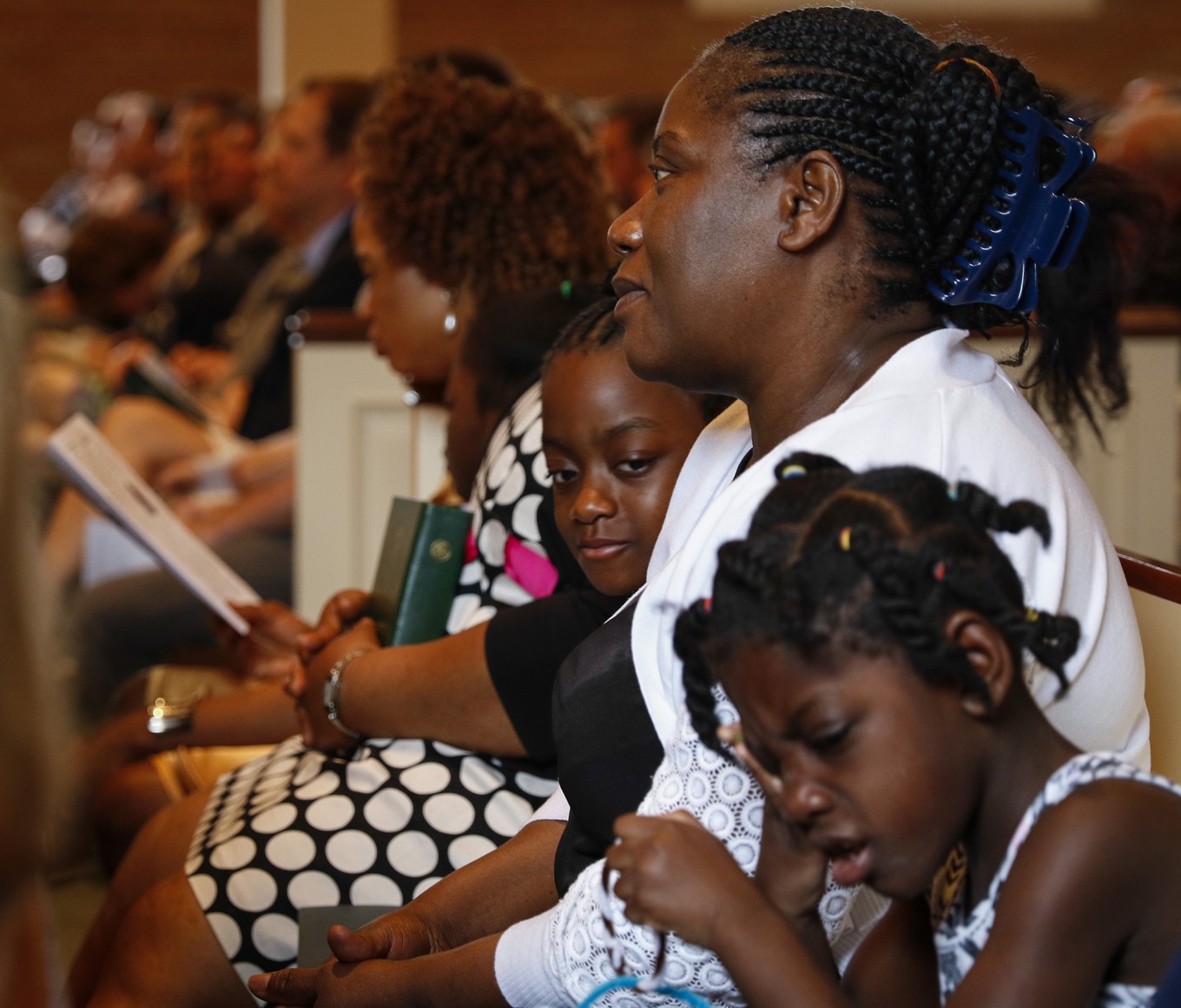 Louise Troh, center, the fiancée of Thomas Eric Duncan, sits with her granddaughters Rose Yah, left, 6, and Knowledge Dopoe, 5,
Louise Troh, center, the fiancée of Thomas Eric Duncan, sits with her granddaughters Rose Yah, left, 6, and Knowledge Dopoe, 5,at Wilshire Baptist Church in Dallas on Easter Sunday, April 5, 2015. (Jim Tuttle/The Dallas Morning News)
The Voices Of Ebola
KERA talked with several people who were affected by Ebola, including patients and their loved ones. Experts, medical officials and elected leaders also offered their perspectives.
Explore the full archive or jump ahead to the following conversations with key voices on Ebola:
- Louise Troh, Thomas Eric Duncan’s fiancée
- Kent and Amber Brantly, Doctor who survived Ebola and his wife
- Nancy Writebol, health care worker and Ebola survivor
- Cole Edmonson, chief nursing officer at Texas Health Presbyterian Hospital in Dallas
- David Lakey, doctor and commissioner of the state’s health department
‘Eric Can Live Forever In My Mind’
Thomas Eric Duncan, a Liberian national, had contracted Ebola in West Africa. Then he traveled to Dallas, where he was misdiagnosed at Texas Health Presbyterian Hospital last September. He was re-admitted into the hospital, where he died Oct. 8, 2014. Last December, Duncan’s family members marked what would have been his 43rd birthday.
KERA traveled to North Carolina to visit Duncan’s family, including his nephew who called Duncan his “twin brother.”
A Mother Remembers Her Son: ‘He Was So Good’
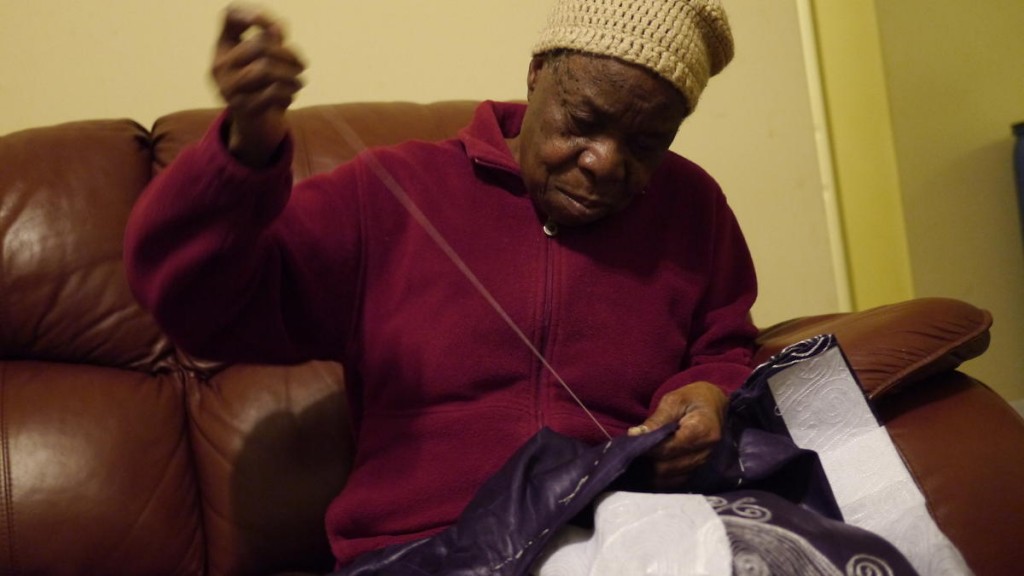
Nowai Gartay Korkoyah, Thomas Eric Duncan’s mother, needles a traditional Liberian cloth called a lapa. Photo: Doualy Xaykaothao, KERA News
If Thomas Eric Duncan, the first person diagnosed with Ebola in the United States, had survived, he’d be celebrating his 43rd birthday Tuesday with family in North Carolina.
“He was born on Friday, 8 a.m. sharp, right in my living room,” said his mother, Nowai Gartay Korkoyah.
It was 1971, on her 3-acre farm, in northeast Liberia. Twenty years later, she says her baby was all grown-up, and managed to deliver to the family hard-to-get supplies during that country’s civil war.
The civil war displaced nearly half a million people, including Korkoyah’s family, first to the Ivory Coast, then to Ghana. In 1990, her daughter was granted political asylum in the U.S.
Now, they live just outside Charlotte.
Another day she’ll never forget? The moment she was told about her son’s death in Dallas, when Texas Health Presbyterian Hospital officials asked her to sit down.
“I said, ‘you want to tell me the truth; I can’t see Eric,’” Korkoyah said. “No Eric. I [am] confused. I don’t know what to do. My son. Let his soul rest in peace.”
Mai Wureh, Duncan’s sister, says this has been a nightmare for her and her family.
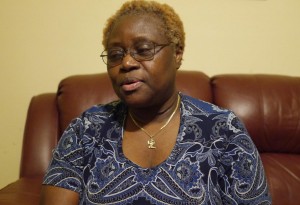
Mai Wureh, Thomas Eric Duncan’s sister, says it’s been a nightmare for her and her family. Photo: Doualy Xaykaothao, KERA News
“Diagnosed in America?” she said. “People came here sick, and they survived. I don’t think he should have died. No, not from Ebola.”
She’s a registered nurse in Charlotte. It was her suggestion that Duncan first go to the emergency room, fearing malaria or typhoid fever, known diseases in Liberia. But Texas Health Presbyterian sent her brother home, even when records showed a 103-degree fever and travel from West Africa.
“That was a red flag,” Wureh said. “I would have keep him there and do more tests. So I was concerned. I kept calling. I said maybe you need to go back to that hospital.”
He did, two days later, and was correctly diagnosed with Ebola.
Duncan’s sister says she still has questions about her brother’s care, and why he died when eight other Ebola patients in the U.S. survived. On Oct. 4, Duncan received his first dose of an experimental drug.
“On the 7th, the report we got was great,” she said. “I went home with high hopes. My mom she hadn’t eaten for days; she was able to eat a full meal. She told her son he was going to make it. I thought he was going to make it, too.”
But her brother died the next morning, without a single family member by his side.
After the tears, occasionally the anger comes back, especially when she thinks about people who called her brother a liar or a criminal.
“Why would he come here with Ebola to infect people?” she said. “To infect his mom, to infect his children, to infect them? I just want to praise God because I’m telling you, there’s a lot of anger.”
The family reached a confidential settlement with the hospital a month after Duncan was cremated. Wureh says her mother didn’t care.
“She just wants her son back,” she said. “What can we do? We have to forgive and move on.”
Josephus Weeks On Thomas Eric Duncan: ‘We’ve Been Together Since Birth’
Josephus Weeks wore jeans and a blue hoodie, with the words “Combatives Instructor.” The U.S. Army veteran stands 5-feet-9-inches, and is somber.
“This is the house, the place Eric and I were supposed to stay,” he said.
He stands in a two-story townhouse with two bedrooms and a back porch that opens up to a small pond.
“Unfortunately, we talked about this, and he was excited to come here,” Weeks said. “He couldn’t wait to make it here, but it didn’t happen.”
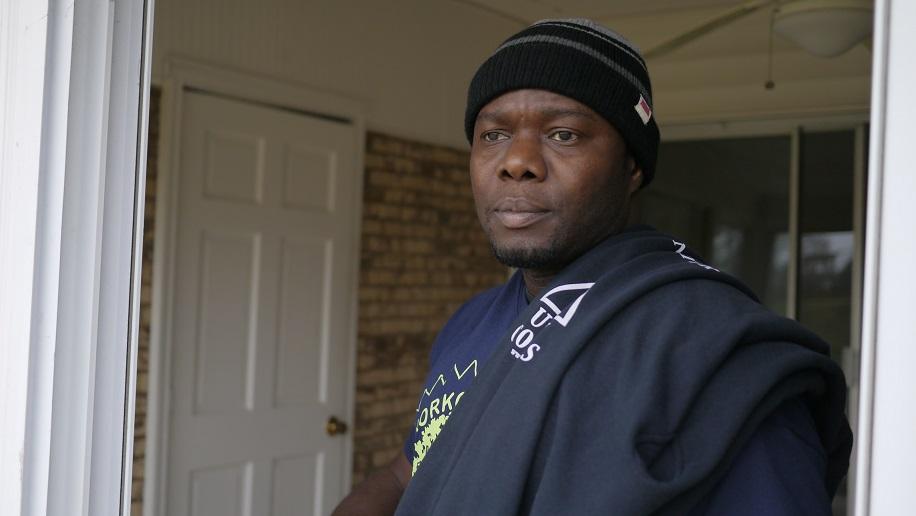
Josephus Weeks says Texas Health Resources accepted they made mistakes while caring for his “brother” Thomas Eric Duncan.
Photo: Doualy Xaokaothao/KERA
Weeks is the nephew of Thomas Eric Duncan. His mother was a teenager when she gave birth in Liberia, so Weeks was raised by his grandmother, who was then pregnant with Duncan.
Weeks became the big brother, he says, because Duncan was the sensitive, non-violent one.
“I was the one who was in fights, always picking up fights for him,” he said. “Somebody mess with him, he would always come running back to get his big brother … me.”
They parted 22 years ago, when the civil war in Liberia displaced tens of thousands of families. They stayed in touch over the years, and when Duncan was hospitalized in Dallas, Weeks was the family spokesman. Sitting in a bedroom that he calls “Eric’s Room,” he says the two were supposed to grow old together.
“Man, he was my road dog,” Weeks said. “We played soccer together. We played basketball together. The girls liked him. He had pretty eyes. He had good hair. I didn’t. … He’s a very kind person, very clean, very neat. We were going to sit out here, watch the lake, discuss our strategy to make our business, to support our kids.”
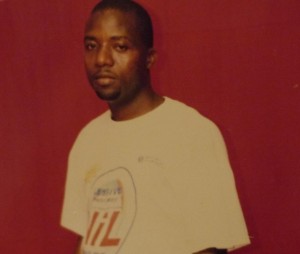
Thomas Eric Duncan, in his younger years, in Monrovia, Liberia. Photo: Courtesy Duncan Family
Like Duncan, Weeks is a single dad. Duncan left behind two boys in the United States, and two girls in West Africa; each has a different mom. Weeks says he’s now the father to all of them.
He also says he’s looking after a memorial fund that Texas Health Resources established as part of a confidential settlement with Duncan’s family. Texas Health Resources is the parent company of the hospital where Duncan died.
Weeks says he wants to help raise money to build a hospital in Liberia for Ebola patients.
“The foundation is him,” Weeks said. “So just like I took care of him, I want to take care of this foundation. …
“I have to get this foundation going so at least Eric can live forever in my mind. So even after I’m dead and gone, his kids can still look at a facility or structure with his name on it, that he’s still here, and their father didn’t die in vain.”
So why is Weeks now working with the hospital, when he was so critical after Duncan’s death?
“The doctors should have done their job, and should have done it the right way,” Weeks said. “And that’s why I was trying to push them to do it. They accepted the fact that they made mistakes. So they have an opportunity to make it right, and if they want to work with me as the family, to go ahead and do something, make this whole situation better, of course I will work with them, give them a second chance, to prove that they are actually competent people … good people, and honorable people. How else can you prove that?”
How Louise Troh Survived Ebola
Last year, when Thomas Eric Duncan became the first person to die from the virus in the U.S., he left behind his fiancée. Louise Troh leaned on her family and faith to make it through.
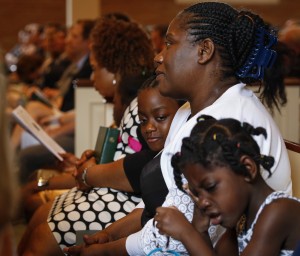
Louise Troh (center), the fiancee of Thomas Eric Duncan, sits with her granddaughters Rose Yah (left), 6, and Knowledge Dopoe, 5,
at Wilshire Baptist Church in Dallas on Easter Sunday, April 5, 2015. (Jim Tuttle/The Dallas Morning News)
When Duncan first developed flulike symptoms after arriving from Liberia, Troh didn’t think much of it. Duncan had suffered from Typhoid fever before — and other people who had visited her from Africa also felt run down when they arrived.
“I was thinking it’s his first time coming and it’s just a climate change,” Troh said. “I wasn’t even thinking about Ebola.”
Soon, Duncan was admitted to Texas Health Presbyterian Hospital in Dallas.
When Troh got the call from a doctor confirming the worst, she was cleaning clothes at her neighborhood laundromat.
“When I heard it, I was already dead. I couldn’t even think,” Troh said. “I was not thinking and people were calling me. From everywhere, they were calling me. And I wouldn’t answer the phone.”
One of the many people Troh relied on as Duncan’s conditioned worsened was her teenage son, Timothy.
“He was my encouragement – he encouraged me. He’s brave, young. … He’s like, ‘Nobody going to call me Ebola – nobody going to talk about Ebola to me because I don’t have it!’” Troh said. “He never worried – if I asked him to take his temperature, he was like, ‘I’m sick of taking temperature – I’m not sick!’ And I said, ‘Well, we have to just listen to them, we have to be obedient, so we can get out of here, OK?’ And he said, ‘OK.’”
Troh said the support of the people around her and her faith got her through. She thought a lot about Moses, Job and other figures from the Bible whose faiths were tested. And she’s come to view Duncan’s death as a sacrifice that saved others.
“He came as, like how Jesus died on the cross for us, because Eric’s death brought a whole lot of attention around the world to Ebola,” Troh said. “Everybody is trying to know about Ebola – study about Ebola – and get a very good medication for Ebola before it spreads all over the world. So, he came and he died as a sacrifice to save the Africans.”
Kent and Amber Brantly, After Ebola
As a doctor, Kent Brantly knew the risks of moving his family from Fort Worth to Liberia so that he could treat people infected with the Ebola virus. And when he contracted the virus himself, many Americans began to pay attention to the growing crisis across the Atlantic. Brantly and his wife, Amber, talked with KERA about defeating Ebola and the drive to serve others. They write about their experience in “Called for Life: How Loving Our Neighbor Led Us into the Heart of the Ebola Epidemic.”
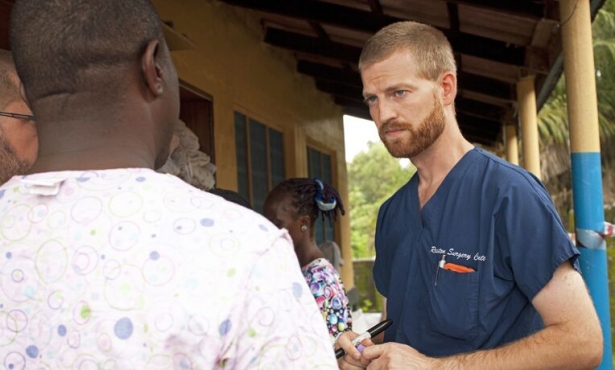
Kent Brantly. Photo: Samaritan’s Purse
On treating Ebola patients in Africa
“It was hard to want to save a life and be totally powerless to do it,” Kent Brantly said. “Our very first patient, she started improving after a couple of days and we thought: ‘We did it. Our first patient is going to survive.’ And then the next day she took a nosedive and within 36 hours she passed away. It was really defeating to see that happen over and over. But we also knew there was no alternative. We couldn’t say we’re done with this. … We had no choice but to continue treating them and to try to do it in the kindest, gentlest, most compassionate way that we could.”
On Ebola’s stigma in Africa
“Part of the problem that led to the spread of the epidemic initially was I think it had to do with the humiliation,” Brantly said. “Not only was it humiliating to the individual as they lost control of their bodily functions and had to have someone to do everything for them — wipe their bottom, literally. But it was also embarrassing to the family members. There was a stigma attached to Ebola. Whether it’s because of the mortality of it or the idea it was from a curse. People did not want to admit that they or one of their family members had Ebola. A family member would get sick and have all the classic symptoms of Ebola and they would keep them at home and the person would die at home and they would try to hide the body in bury it themselves because they didn’t want anybody to know that there was Ebola in their home.”
On being diagnosed with Ebola
“I thought it was the pizza with tabasco sauce I had the night before,” Brantly said. “I thought it was malaria. When I developed a fever, that kind of changed the game. I didn’t think I had Ebola. Maybe mentally I was denying it. … I was holding onto hope it was something else. But I isolated myself and no one came into my house without putting on personal protective equipment. Maybe it was denial but at least it was functional denial.”
‘How does God work?’
“I am so thankful to all of the people who prayed for me,” Brantly said. “I don’t think that I’m alive today because prayer works by whoever has the most people praying for them wins. It makes me wrestle with how God works. I still believe with all my heart that he is ultimately behind my survival just like he is behind the survival of everyone else who made it. … I thank God that I am alive today and I give him the credit for it, but there’s a real tension there that 11,294 other people have died – 11,294. And the outbreak’s not over. And there are people dying every week.”
‘Why do I get to live?’
“Why do I get to live when so many other people have died?” Brantly said. “So many of my friends, so many of my coworkers, died. How is it that I’m alive and they’re not? I will always wrestle with those questions but I may never come up with a satisfactory answer.”
Nancy Writebol Plans To Return To Liberia
In September 2014, two missionaries became the first Americans diagnosed with Ebola in Liberia: Kent Brantly, a doctor who was trained in Fort Worth, and health care worker Nancy Writebol. Last February, Writebol and her husband David were in North Texas to talk with students at Dallas Theological Seminary.
Writebol said in the months before she was infected, so many people were dying at the Liberian clinic that only one person made it out.
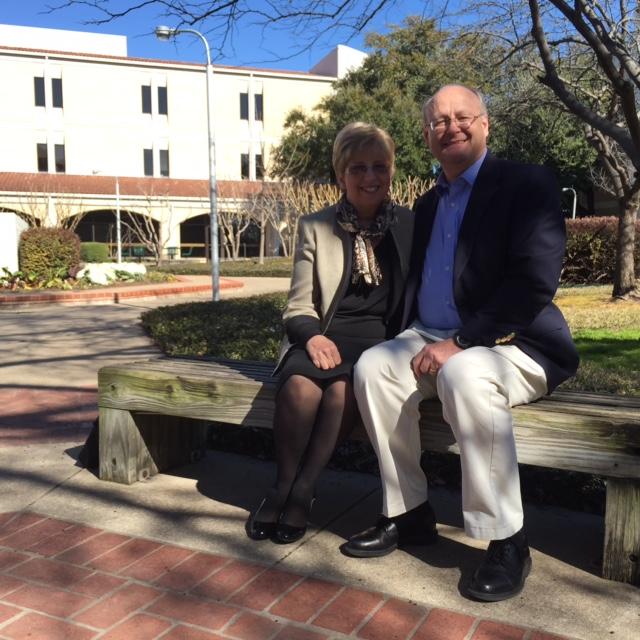
Nancy Writebol and her husband David at the Dallas Theological Seminary. Photo: Lauren Silverman, KERA News
Ebola ‘is cruel’
“It ravishes the body. And it’s cruel; the disease is cruel,” Writebol says.
In the first few months of treating Ebola patients for Serving In Mission, Writebol remembers the lone survivor, an 11-year-old boy.
“I was very thankful that he survived; we all were,” she says. “It was amazing to see the day when he could walk out of there and go home to his family.”
On keeping her faith
“We just kept praying for every patient that came,” Writebol says. “When the doctors and nurses got ready to go in to isolation we always prayed as a team before they went in, prayed for the patients, prayed that the doctors and nurses would know how to deal with them physically.”
On returning to Liberia
“We look forward to going back,” she says. “We have at our hospital begun an Ebola survivor’s clinic. So I’m looking forward to helping in that clinic and I’m looking forward also to helping get ministries started back up again.”
EBOLA: LESSONS LEARNED
A ‘Very Challenging Time’ For Presbyterian
Cole Edmonson spent the fall of 2014 facing the biggest challenge of his career. He’s chief nursing officer at Texas Health Presbyterian Hospital in Dallas, which means he oversees 1,300 nurses. Two of them contracted Ebola after treating Thomas Eric Duncan. One of them, Nina Pham, was declared Ebola-free and released from the National Institutes of Health in Bethesda, Md. The other, Amber Vinson, was treated in Atlanta.
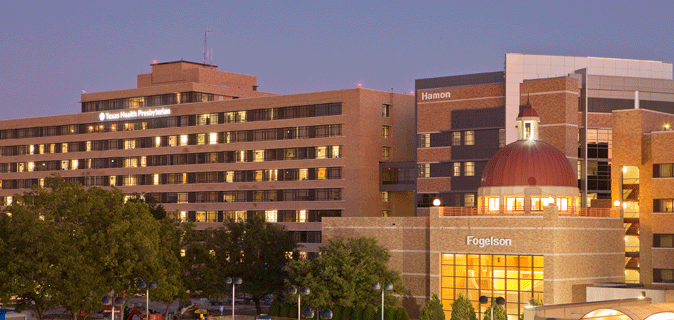
‘A very difficult time’
“We have most certainly been in a very difficult time, a very challenging time for our organization, for all of those that have been involved in the care and also work at Presbyterian,” Edmonson said. “We’re really proud, though, of what we’ve been able to accomplish and what we’ve been able to do during this incredibly challenging time.”
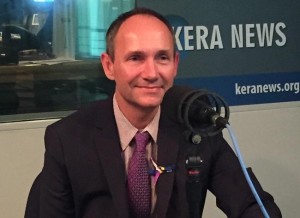
Chief nursing officer Cole Edmonson oversees 1,300 nurses at Texas Health Presbyterian Hospital in Dallas. Photo: Krystina Martinez, KERA News
His reaction to Nina Pham’s diagnosis
“I think the first thing I did was cry,” he said. “I was really devastated by her diagnosis, just as my colleagues were and everyone that knows and loves Nina. We were all shocked, and we were definitely taken aback by what was really happening and it was almost surreal. We immediately though went into action to take care of our colleague to make sure that she was comfortable and that she had everything that she needed and to also reassure her that we were going to be there for her as her family.”
What he would say to someone scared to visit Presbyterian
“I would tell them to look at the history of Presbyterian, that we are a safe hospital, that we’re a secure hospital, that we’re a wonderful hospital that’s been in the community for over 50 years. This is one occurrence in our facility, so we would tell you that it’s safe to be at Presbyterian and you’re secure when you’re there.”
Texas’ Top Health Official Reflects On Ebola
For weeks, North Texans who might have been exposed to Ebola were monitored for potential symptoms. Last November, Dallas was declared Ebola-free. Dr. David Lakey, who was commissioner of the state’s health department, talked about what happened in Dallas — and the state’s response.
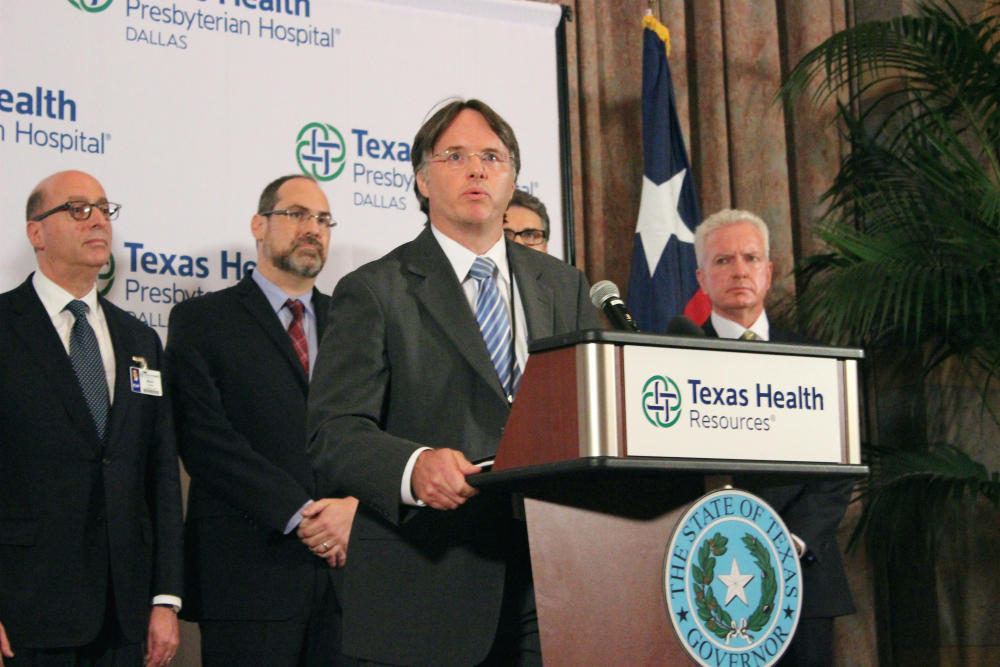
Dr. David Lakey at a press conference Oct. 1, 2014. Photo: Krystina Martinez/KERA
On the decision to create an ‘Ebola containment center’ in Richardson
“We had been caring for individuals at Presbyterian,” Lakey said. “In my opinion, and in other people’s opinion, we needed to get Presbyterian back on its feet. They had really gone through the mill with their nurses being infected, with the staffing challenges that they had, it was time to let Presbyterian heal and we needed to identify a place here in North Texas that could care for those individuals. Part of the calculus was that if you did that at Parkland or UT-Southwestern [Medical Center], you’d have the potential of taking down another major hospital in Dallas if one of those individuals became ill.”
On the apparent confusion in the public health system when Thomas Eric Duncan was diagnosed
“I think a lot of folks were afraid,” Lakey said. “It hit on many levels – it hit on the cleaning crews and who would come in and who would not. There were a lot of attempts to move the family [of Thomas Eric Duncan] to another apartment. They couldn’t find anyone that would lease their apartment to the government to move those individuals in and part of that was if [the landlords] knew that they did, there would be a media frenzy right in front of the apartment. I wouldn’t underestimate the media’s impact on the ability to get some things done.”
On the biggest lesson learned
“As you approach [disaster] events, there will be surprises,” Lakey said. “Your plans are not going to be perfect and you need to accept that and be willing to change your plan in order to meet the challenge that you face on the ground.”
EBOLA IN WEST AFRICA
In the spring and summer of 2014, the Ebola outbreak affected countries in West Africa. In the summer of 2014, Dr. Kent Brantly was working with Ebola patients in Liberia when he was diagnosed with the virus. A panel of North Texas infectious disease experts talked about whether Ebola could spread in the United States.
Battling Ebola In West Africa Vs. U.S.
Dr. Seema Yasmin said there’s actually a simple explanation why Africa sees outbreaks like this and the U.S. does not. When Americans get sick, that fear drives them to a doctor. In Africa, it can drive them away.
“It’s understandable that people are scared,” said Yasmin, a professor at the University of Texas at Dallas and a health reporter for The Dallas Morning News. “They’ve seen their loved ones taken away from the village, sick but alive, put into these tents — sometimes scary-looking facilities. And when they exit, they’re in a body bag. And they don’t know what’s happened in the interim.”
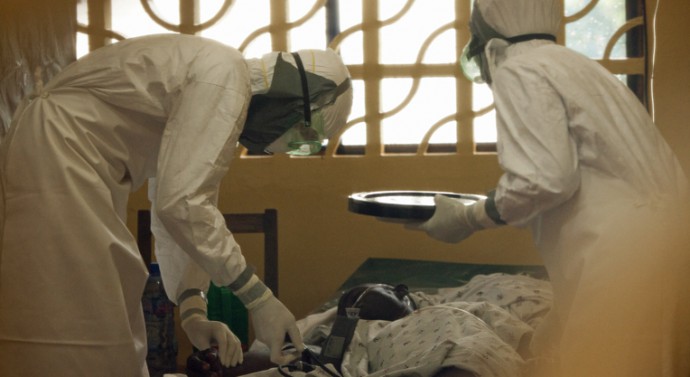
Photo: Samaritan’s Purse
But what if one of those sick people managed to make it onto an airplane bound for the United States? Dr. Robert Haley, an infectious disease expert at UT-Southwestern, says if that person began showing symptoms while in the air, the pilot is obligated to alert medical personnel before even opening the doors.
“So if you had a person who had flown from West Africa right now, who came in with fever, then the plane would be met by one of these emergency medical personnel, who would assess the situation and handle it the appropriate way,” Haley said.
Still, Ebola has an incubation period between two and 21 days – plenty of time for a sick person to walk off a plane feeling fine. But in the U.S., when someone experiences the flu-like symptoms associated with the early stages of Ebola, odds are they’re going to get checked out.
Dr. Cristie Columbus, an infectious disease expert with Baylor University Medical Center, said that shouldn’t be a problem – even in the waiting room of an emergency room that’s full of other sick people.
“Typically, if a patient presented to the emergency room in such a dire type of situation, they would be triaged immediately back, most likely to a private room and would not remain in the waiting room,” Columbus said.
Once they’re seen by a doctor, Haley says a thorough patient history is a key to isolating Ebola.
“And the key is, if somebody has a flu-like illness, but they’ve been in West Africa, or they’ve been caring for somebody who has Ebola … they would get that history and quickly they would put that person in isolation,” Haley said.
EBOLA ARRIVES IN DALLAS
Just a few weeks later, in September 2014, Thomas Eric Duncan flew from Liberia to Dallas. He got sick. In late September, he went to the Texas Health Presbyterian Hospital in Dallas. The hospital sent him home. On Sept. 28, he went back to the hospital, this time in an ambulance. On Sept. 30, the Centers for Disease Control and Prevention confirmed Duncan had Ebola.
Trying To Contain Ebola In Dallas
Soon after Duncan’s diagnosis, Dr. Robert Haley with UT-Southwestern Medical Center in Dallas told KERA that North Texas should expect more than the one case of Ebola.
But Haley said a quarantine should prevent Ebola from becoming widespread.

Dr. Robert Haley is chief of epidemiology and professor of internal medicine at UT Southwestern. Photo Courtesy UT Southwestern
Duncan had reportedly helped a pregnant woman in Liberia who died from Ebola. He had been staying at a northeast Dallas apartment before he sought treatment at Texas Health Presbyterian Hospital.
Dr. David Lakey, the Texas health commissioner, signed an order requiring family members who were staying with Duncan to remain in their apartment and not have any visitors. The Texas Department of State Health Services said health officials were contacting about 100 people who may have come in contact with Duncan or people he encountered.
Do you believe the number of Ebola cases can be limited to the one man already infected?
“I don’t know if we can limit it to one case because his family, the people who were in the home with him over the last several days before he came in, they are at grave risk,” Haley said. “They will be watched carefully and if they develop fever, they will immediately be put in the hospital in isolation probably before they become infectious. Then they’ll be given IV fluids, very aggressive management with supportive measures and we will greatly reduce their risk of dying.”
For those patients who may become infected, including Duncan, what can be done for them?
“If you’re in West Africa, there’s just no ability to treat people there,” Haley said. “There hasn’t been much. Now in this country it’s different. In our modern hospitals we have aggressive, supportive therapies. That’s intravenous fluids, monitoring the blood chemistry with rapid laboratory tests where we can see where we are in terms of maintaining the body’s chemistry just right. And if the person develops where they can’t breathe, you can put them on a ventilator to tide them over until they start recovering.”
“There could be an ER person or maybe an ambulance driver who would possibly come down with it,” Haley said. “I would be very surprised because our hospital workers and paramedics are very well trained to protect themselves. If they develop fever, they will immediately go to the hospital and not be infectious to others.”
Ebola And The Psychology Of Fear
Worrying about Ebola — or any other scary disease — isn’t a total waste of time, psychologists say. Anxiety activates us.
“And that is true when you take measures that really make your life safer – for example, washing your hands,” said Dr. Alicia Meuret, director of SMU’s Anxiety and Depression Research Center. “But worrying about the catastrophic outcomes that may occur won’t change the odds.”
Our fear of these catastrophic outcomes is linked to the lack of control we feel over them. The classic example is people who fear flying but not driving – even though, statistically, driving is much more dangerous.
Dr. Madhukar Trivedi is chair of UT Southwestern’s mental health department.
“People who have a fear of flying will describe it very vividly,” Trivedi said. “In a car, at least I know where to break, when to stop – I have control over the steering wheel. Whereas in a plane, I have no control.’”
The fix for this type of fear is experience. Once you’ve flown several times and landed safely, you begin to worry less. But you still have to take that first flight.
“Only by being in the situation, one can realize that the fears that one has about a catastrophic outcome do indeed not occur,” Meuret said.
And when it comes to Ebola, very few of us have been close enough to it to have conquered those fears.
Ebola And The Law
As the medical community fought to contain Ebola, the virus was also challenging another field: the law.
Nathan Cortez said there’s a good reason why these questions are tough to answer.
“We’re kind of flying blind on a lot of these legal issues. … You often hear, ‘This is not our first rodeo,’” Cortez said. “This actually is our first rodeo.”
Cortez is an associate professor of law at SMU who specializes in health care and biotechnology.
“What’s interesting looking at federal and state law is how frequently the statutes use the words ‘reasonable’ and ‘appropriate’ and ‘necessary,’” he said. “And my takeaway from that is that the statutes are really trying to give public health authorities a lot of discretion to do as they see fit.”
That’s what allows public health officials to enforce quarantines and check the temperatures of passengers at airports.

Dallas police monitored the apartment complex in East Dallas where the healthcare worker who tested positive for Ebola lives. Photo: Lauren Silverman, KERA News
“The more lethal the threat, the higher the level of power the governmental officials have to try to contain it,” said Laura Reilly O’Hara, a partner at Strasburger and Price LLP who specializes in the healthcare industry.
There are a few precedents, such as patient privacy. Cortez says the law allows for public health officials and law enforcement to know the identity of someone who could spread disease. But then the flow of information tightens.
“You read these statutes, you don’t see any exceptions for newsworthiness, or for someone whose medical information you want because you live down the street or your child goes to school near that person,” Cortez said.
And when it comes to malpractice, O’Hara says the question a suit would have to answer is whether the care provided is considered reasonable.
“When you’re looking at a disease that has never been diagnosed on this continent, who’s to say what the reasonable care is in that context?”
And in the case of an emergency room, O’Hara said prosecutors would have to show that a doctor or nurse intentionally mistreated a patient.
Ebola Hits Presbyterian, North Texas Hospitals Prepare
Dr. Alex Eastman, the medical director of disaster preparedness for Parkland Hospital, said the news that two Texas Health Presbyterian nurses who treated Duncan contracted Ebola only strengthened Parkland’s resolve to be prepared with a response plan.
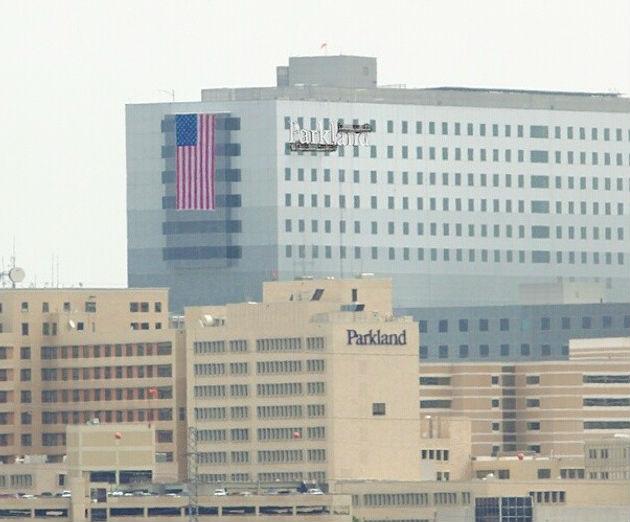
Photo: Facebook
“We’re screening every patient who seeks care throughout the emergency system,” Eastman said. “Just in the emergency department alone, the main campus, since August [2014], we’ve screened more than 42,000 people who’ve sought care at the Parkland emergency department.”
Patients have been asked about whether they’ve traveled to countries where people have been diagnosed with Ebola.
The hospital has prepared for all sorts of scenarios. “Everything from … who transports the patient, how we move them through the hospital – all those things have been pre-identified, pre-planned, and ready to go in the event we have to do this for real,” Eastman said.
Why come up with an Ebola plan?
“We’re a global city with a large international airport and a large international presence, watching this develop on the African continent, it was only a matter of time until we saw some in the United States,” Eastman said. “Being vigilant in our disaster management staff and program, making sure that the hospital was prepared, was what prompted that enhanced screening.”
UNDERSTANDING EBOLA
Just weeks after officials declared North Texas was Ebola-free, news of the virus started to slip out of the headlines. Slowly, West Africa is prying itself free from the grip of the Ebola virus.
When Ebola Is Contained, Where Does It Go?
When a virus is contained, where does it go? David Quammen talks about why it’s tough for scientists to track the virus once an outbreak ends. He wrote about the topic in the July issue of National Geographic.
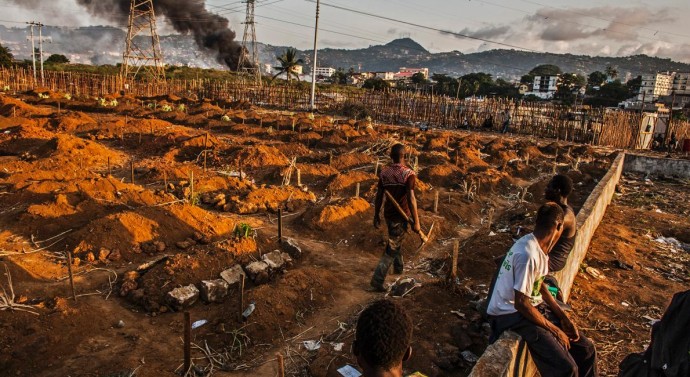
Quammen says that scientists at least have a general idea of where to look for Ebola – the same place any other virus hides out.
“Viruses can only replicate in living cells – viruses are not cellular creatures themselves,” Quammen said. “They’re not even quite alive, depending on how you define life. They can only replicate using the cell machinery of a living cell. That means they’ve got to abide in another creature – a plant, an animal, a fungus.”
Viruses that affect humans, including Ebola, are usually hosted by animals like bats or rodents. And even though the recent Ebola outbreak was in the news for more than a year, Quammen said it’s actually tough for scientists to track it down while it’s active.
There is reason to be optimistic about tracking down Ebola, though. Quammen says the African outbreak generated so much media attention that the scientific community will likely be able to raise the necessary funds to continue hunting the virus. Also, three types of fruit bats are now known to contain both antibodies against Ebola and fragments of Ebola RNA, a building block of the virus.
“To find antibodies against Ebola or fragments of Ebola RNA is like finding the footprints of a yeti in the snow. But to isolate live virus is like finding the foot of a live Yeti in a leghold trap,” Quammen said. “And that hasn’t yet been done with Ebola.”
Once scientists can actually identify the live Ebola virus in those wild reservoir hosts, they’ll have clearer insight into how human outbreaks begin.
KERA’s Krys Boyd, Stephen Becker, Lauren Silverman, Krystina Martinez, Sam Baker, Shelley Kofler and Doualy Xaykaothao conducted the interviews.
Selected photos courtesy of The Dallas Morning News.

